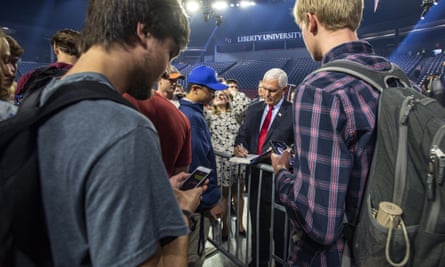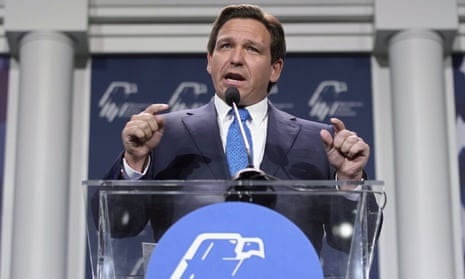In one of the clearest signs that the 2024 Republican presidential primary will feature rivals to Donald Trump, a host of likely candidates have released or will soon release books purporting to outline their political visions.
Such books often sell poorly, but that is rarely their point. They are markers of ambition. To judge from the political bookshelves, after midterm elections in which many Trump-endorsed candidates suffered humiliating losses, the former president will not be the only declared candidate for long.
Among the first rank of likely challengers, Trump’s vice-president, Mike Pence, released a memoir last month and Ron DeSantis, the governor of Florida, will follow suit in February.
Other possible candidates include the former secretary of state Mike Pompeo (book out next year); the Missouri senator Josh Hawley (one book done, another coming); the former UN ambassador Nikki Haley (two books out already); and the South Carolina senator Tim Scott (book published in August, including an inadvertent admission that he is going to run). Even Marco Rubio, the GOP’s great slight hope until Trump took him to the cleaners in 2016, has another book coming.
Matt Dallek, a professor of political management at George Washington University, said: “These books serve as a way to generate free media and a way to put one’s name and platform, to an extent that it exists, in the eyes of voters you’re looking to reach.
“It gives TV producers a hook. And so even though most of these books are, to be generous, pablum – filled with aphorisms and cliché – from the perspective of the candidate, it allows them to get their story out there, to put themselves before the public and to take a free media ride.”
In short, these are not works of great literature, or even the sort of thing the great essayist Christopher Hitchens produced via “the junky energy that scotch can provide, and the intense short-term concentration that nicotine can help supply … crouched over a book or keyboard [in] mingled reverie and alertness”.
It’s hard to picture evangelical hero Pence or culture warrior DeSantis like that, hunched over a desk, hammering out passages of memoir and policy to meet a publishing deadline. But perhaps their ghostwriters did.
The announcement this week of DeSantis’s book – The Courage to Be Free: Florida’s Blueprint for America’s Renewal – made the biggest splash. After all, the governor who won re-election in a landslide and declared his state “where woke goes to die” is Trump’s only serious polling rival.
DeSantis has released a campaign book before, namely Dreams From Our Founding Fathers: First Principles in the Age of Obama, published in 2011 when he was aiming for Congress. According to his publisher, HarperCollins, the Ivy League-educated ex-navy lawyer will now offer “a first-hand account from the blue-collar boy who grew up to take on Disney and Dr Fauci”. True to DeSantis’s success in pursuing distinctly Trumpist policies, the announcement was replete with such culture-war themes.
Daniel Uhlfelder, a former Democratic candidate for Florida attorney general, tweeted: “Ron DeSantis, who has led a statewide effort to ban books, is writing a book called The Courage to be Free. This is not a joke.”
Trump books are a publishing phenomenon but books about what the agent Howard Yoon recently called the “milquetoast” Biden administration have not sold so well. Neither, it seems safe to say, will the flood of Republican books.
Asked if she was eager to read DeSantis’s book, Molly Jong-Fast, host of the Fast Politics podcast, laughed and said, “Are you kidding me?” She also pointed to the common fate of such books: bulk sales to political groups rather than bookstore crowds.
“The DeSantis book is something the Heritage Foundation gives people at a lunch, and then goes on a shelf. This is book that is swag. When the Kochs have their big shindig with donors, it’ll be given away. Of course, that means publishers at least know it will earn out the advance.”

In sales terms, Pence has an advantage. His campaign book, So Help Me God, is also in large part a Trump book. Pence has refused to testify to the House January 6 committee but on the page he provides detailed if partial testimony, written from the rooms where it happened. The result was a New York Times bestseller.
Jong-Fast said: “The reason to read his book is because he’s such a liar. I think if you went through with a fine-tooth comb, you could find a lot of inconsistencies. But … at least Pence is charismatic. The irony is he’s probably more charismatic than Ron DeSantis.”
It is possible to write a good campaign book. Barack Obama wrote two. Dreams from My Father: A Story of Race and Inheritance was published in 1995, as he set out for the Illinois senate. The Audacity of Hope: Thoughts on Reclaiming the American Dream, came two years before the presidential run of 2008.
“And he probably read them,” Jong-Fast said. “And also he knows good writing. So many people don’t. The constant problem with conservatives is that you’ve alienated most of the writers. Remember, Trumpworld didn’t have any intellectuals because they couldn’t find any. The thought leader was Newt Gingrich.”
Asked what Guardian readers might glean from the new campaign books, and from DeSantis in particular, Dallek said: “If you know nothing or little about him, you could probably learn about the biggest political fights he’s had, you could get a sense of the soundbites he likes to use, you know, his war against so-called woke culture. Probably some sense of a why he thinks Florida is the greatest place on Earth, some of the attacks he’s going to use against Joe Biden, if he were to run.
“But it will not be the most informative place to go if you want to learn about Ron DeSantis. There are many other places, including profiles in the Guardian, that would probably be much more fruitful.”
